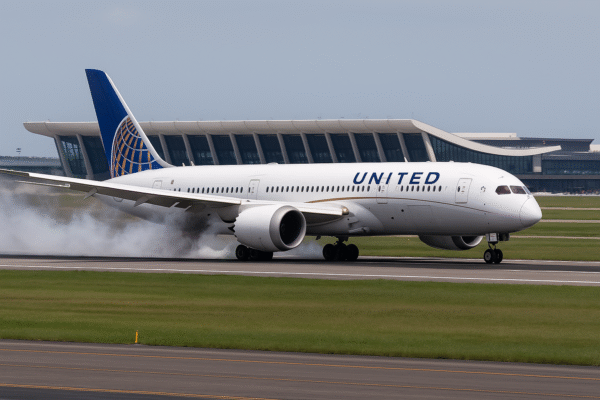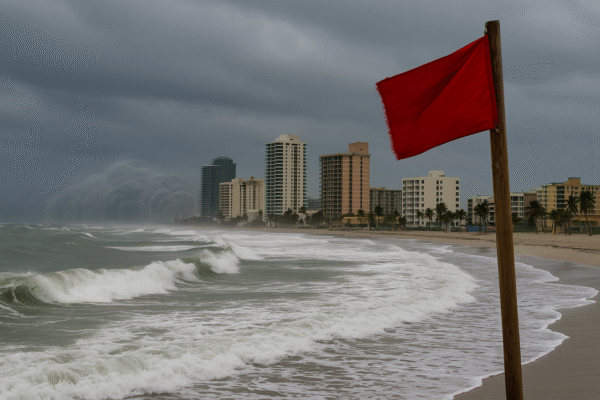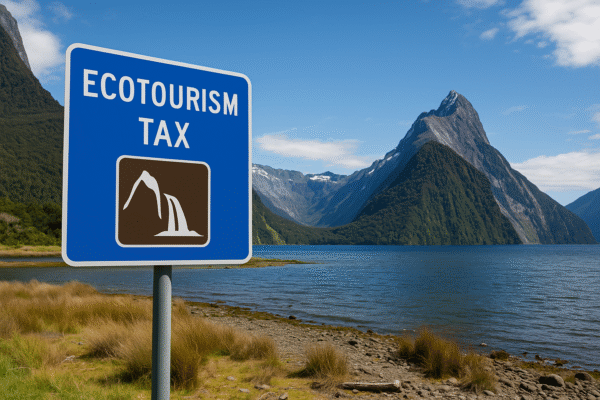The Atlantic hurricane season has entered a turbulent phase, with Tropical Storm Dexter now swirling offshore near the Carolinas. While it remains far from making landfall, Dexter is already sending powerful surf and rip currents toward coastal destinations from Florida to Massachusetts, affecting both tourism and travel infrastructure across the region.
This developing tropical system has not only led to the rerouting of several cruise itineraries but also caused local governments and beach resorts in both the United States and the Caribbean to issue red flag warnings. According to the National Hurricane Center (NHC), Dexter is expected to track northeast into cooler waters and weaken by week’s end. However, its impact on travel plans, coastal safety, and marine operations is already being felt.
Beaches on Alert: Coastal Hazards for Tourists
Beaches along the Eastern Seaboard are now facing hazardous conditions. AccuWeather and NOAA warn that rough surf, elevated tides, and life-threatening rip currents are expected to persist throughout the week. Travelers heading to Myrtle Beach, South Carolina, or Virginia Beach, Virginia, should anticipate restricted access to the ocean, canceled water sports, and possible temporary closures of beachfront facilities.
Tourism operators in Miami, Charleston, and Savannah are adjusting their schedules in real time. Lifeguard agencies and local authorities have advised caution, especially for tourists unfamiliar with Atlantic surf conditions.
Second Storm Looming Off the Southeast Coast
While Dexter stirs trouble offshore, meteorologists are closely monitoring a second tropical system forming off the Southeast US coast. This disturbance, born from the same stalled front that gave rise to Dexter, is developing rapidly over warm waters fed by the Gulf Stream.
The NOAA gives it a medium-to-high probability of becoming a named storm within the next 72 hours. Should it strengthen, the Carolinas, Georgia, and Virginia could experience additional rounds of tropical downpours, gusty winds, and potential flash flooding.
Travel Disruptions Expected Across Coastal States
As the new system evolves, road travel, air traffic, and cruise schedules across affected states may be impacted. Several airports have already issued weather advisories, and major US airlines are offering waivers for passengers flying into Charleston International, Savannah/Hilton Head, and Norfolk International airports.
Ground tours, especially those exploring historic Southern coastal cities, may be rescheduled or canceled. With saturated grounds from prior rains, any additional precipitation could lead to localized flooding and travel detours.
Tropical Wave in Caribbean Raises Gulf of Mexico Concerns
Farther south, a tropical wave is sweeping across the northern Caribbean, currently affecting areas like Puerto Rico, the US Virgin Islands, and the Dominican Republic. Though currently disorganized, it is moving into warmer Gulf waters, where the National Hurricane Center estimates a 30-40% chance of development over the next five days.
This means tourists heading to Jamaica, Trinidad & Tobago, or even Cancún should monitor updates closely. If the system strengthens in the Gulf, states like Texas, Louisiana, and western Florida could also see effects late next week.
Another Storm Emerging from Africa May Become Hurricane Erin or Fernand
In addition to the storms brewing near the Americas, a robust tropical wave has just exited Africa’s west coast. This system is showing strong signs of development and may become Tropical Storm Erin or Fernand in the coming days.
Forecasters say its trajectory depends on mid-Atlantic atmospheric patterns. If a Bermuda High remains dominant, the system could head westward toward the Caribbean or southeastern US. If steering currents shift, it may curve into the open Atlantic.
August: Peak Hurricane Season Calls for Smart Travel Planning
Historically, August marks the height of hurricane season in the Atlantic. The NOAA 2025 seasonal outlook predicts an above-average year, with up to 21 named storms expected. Travelers planning vacations to coastal cities, island resorts, or cruise lines should be on high alert for travel disruptions, insurance needs, and emergency planning.
Many airlines and cruise companies now offer flexible rebooking policies in the event of tropical disturbances. It’s highly advisable to check the terms of your travel insurance and monitor official updates via weather.gov, NHC, and local tourism boards.
Final Tips for Travelers: Stay Flexible, Stay Informed
If you’re planning to visit Florida, the Outer Banks, or Caribbean destinations this month, staying flexible is key. Pack essentials for storm delays, register for travel alerts, and build a backup itinerary.
The formation of Tropical Storm Dexter and other emerging systems signals the need for heightened awareness. The ripple effects of a single storm can stretch across thousands of miles of airspace and coastlines, affecting everyone from beachgoers to business travelers.
Conclusion: Storm Season in Full Swing
With Tropical Storm Dexter leading the charge, the 2025 hurricane season is no longer a distant forecast—it’s here. American travelers and Caribbean tourists must remain vigilant, watch the skies, and be ready to adapt. Being proactive isn’t just smart—it’s essential for a safe and enjoyable trip during this active tropical season.
For more travel news like this, keep reading Global Travel Wire






















